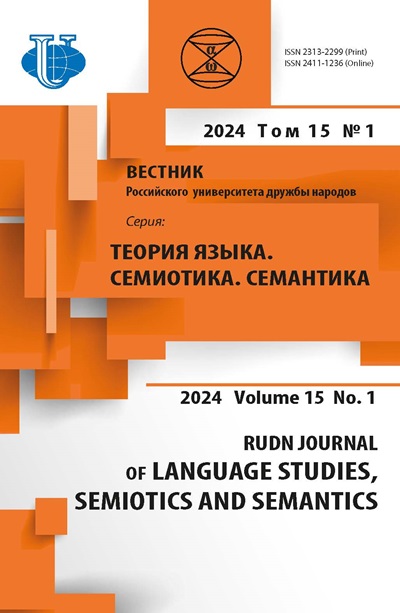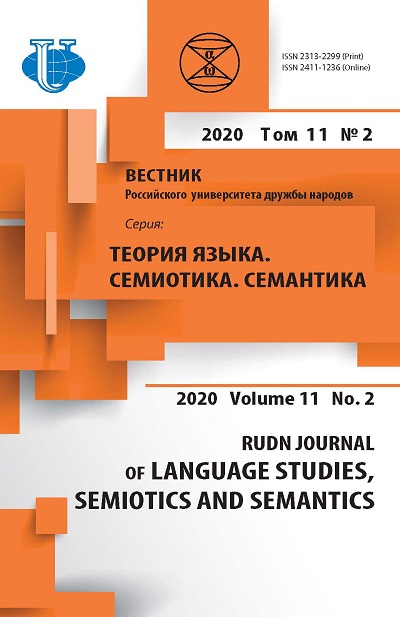Phraseological Units with the Word “Bread” in Russian, Frenchand Italian Linguocultures
- Authors: Kaskova M.E.1, Ustinova O.V.1, Bolshakova E.K.1
-
Affiliations:
- Peoples’ Friendship University of Russia (RUDN University)
- Issue: Vol 11, No 2 (2020): Semantics of Universal and Specific in the Language and a Text
- Pages: 319-329
- Section: PAROEMIAE IN LANGUAGE AND TEXT
- URL: https://journals.rudn.ru/semiotics-semantics/article/view/23584
- DOI: https://doi.org/10.22363/2313-2299-2020-11-2-319-329
Cite item
Full Text
Abstract
Language is not only a means of communication between people, but also the cultural memory of the speakers of this language. We believe that in linguistic units there is cultural information that indicates the existence of a category that correlates language and culture, and makes it possible to describe their interaction. A way of verbalizing a culture using linguistic signs is called cultural connotation. Cultural categories are a kind of stereotypes, symbols, standards, mythologemes, archetypes, rituals and other signs of both national and universal culture. The linguistic picture of the world is one of the key concepts that characterize the peculiarity of the relationship between people and the world around them, because “captures a certain image of the world, which is never a mirror image of the world”. The national specificity is revealed in phraseology most of all. It is the phraseological composition of the language that most fully reflects the features of speech behavior, the specificity of the national mentality, manifested through cultural codes. The phraseological image is essential in modeling the linguistic picture of the world of a particular people. In this article, the subject of research are Russian, French and Italian phraseological units with the word “bread” from the point of view of linguoculturology, which allows us to identify the national-cultural identity of the phraseological units under consideration. We believe that the internal form of the phraseological unit contains a certain cultural code, that is, with the help of phraseological units it is possible to characterize representatives of one or another nationality. The subject of this article is a comparative analysis of phraseological units that have the word “bread” as the main component. The object of research is the features of the use of this word as a fragment of the lexical and phraseological systems of the Russian, French and Italian languages. The article compares phraseological units with the “bread” component, which historically goes back to free phrases, analyzes the processes of rethinking both the whole expression and its components. Using the example of phraseological units, we will analize how the lexeme “bread” loses its literal meaning “food” and acquires a new content, introducing new meaning into the semantic structure of the phraseological phrase. The problem under study is very relevant, because it is caused by the growing interest in modern linguistics to study of the mechanisms of secondary nomination in different languages and the identification on the material of phraseological units of specific features of verbal thinking and perception of the surrounding reality by language groups.
About the authors
Margarita E. Kaskova
Peoples’ Friendship University of Russia (RUDN University)
Author for correspondence.
Email: 37margo@rambler.ru
PhD in Pedagogy, Associate Professor of the Department of Theory and Practice of Foreign Languages
6, Miklukho-Maklaya street, Moscow, 117198, Russian FederationOlga V. Ustinova
Peoples’ Friendship University of Russia (RUDN University)
Email: deptphilology@gmail.com
PhD in Philology, Associate Professor of the Department of Theory and Practice of Foreign Languages
6, Miklukho-Maklaya street, Moscow, 117198, Russian FederationElizaveta K. Bolshakova
Peoples’ Friendship University of Russia (RUDN University)
Email: bol.elisabetta.k@gmail.com
Assistant Professor of the Department of Theory and Practice of Foreign Languages
6, Miklukho-Maklaya street, Moscow, 117198, Russian FederationReferences
- Alefirenko, N.F. (2005). Controversial issues of semantics: monograph. Moscow: Gnosis. (In Russ).
- Apresyan, Yu.D. (1995). Lexical semantics. Moscow: School “Languages of Russian Culture”. (In Russ).
- Bally, S. (2005). General linguistics and questions of the French language. Moscow: Publishing house of foreign countries. (In Russ).
- Basko, N.V. (2003). Russian phraseological units are easy and interesting. Moscow: Nauka. (In Russ).
- Telia, V.N. (2006). Russian phraseology. Semantic, pragmatic and linguocultural aspects. Moscow: UNITY. (In Russ).
- Telia, V.N. (2011). Types of language meanings: The associated meaning of a word in a language. Moscow: Nauka. (In Russ).
- Kovshova, M.L. (2010). Semantics and pragmatics of phraseological units (linguocultural aspect). Moscow: Flinta. (In Russ).
- Buslaev, F.I. (2004). Russian floorboards and sayings, compiled and explained. Moscow: Russian language. (In Russ).
- Vezhbitskaya, A. (1997). Language. The culture. Cognition. Moscow: Russian dictionaries. (In Russ).
- Vereshchagin, E.M. & Kostomarov, V.G. (1990). Language and culture: Linguistic and regional studies in the teaching of Russian as a foreign language. Moscow: Russian language. (In Russ).
- Vinogradov, V.V. (2007). Selected Works. Lexicology and lexicography. Moscow: Vysshaja shkola. (In Russ).
- Vardazaryan, A.V. (2012). National-culturological features of the metaphorical phraseological units in West Romance languages. Vestnik of Moscow State Linguistic University, 643, 9—21. (In Russ).
- Kubryakova, E.S. (2004). Of cognitive science guidelines and vital problems of cognitive linguistics, Issues of Cognitive Linguistics, 1, 6—17. (In Russ).
- Kubryakova, E.S. (2004). The initial stages of the formation of cognitivism: linguistics, psychology, cognitive science. Voprosy Jazykoznanija, 3, 34—47. (In Russ).
- Kryukova, G.A. Concept. Determination of the scope of the concept. URL: http://cyberleninka.ru/article/n/kοntsept-οpredelenieοbema-sοderzhaniya-pοnyatiya, free (accessed: 02.02. 2020).
- Demyankov, V.Z. (2003). Cognitive linguistics as a kind of interpretive approach. Moscow: Nauka. (In Russ).
- Gukhman, M.M. (2008). The grammatical category and structure of paradigms In Studies in the general theory of grammar. Moscow: Nauka. (In Russ).
- Kuznetsov, A.M. (2010). Structural and semantic parameters in vocabulary (based on English). Moscow: Nauka. (In Russ).
- Kuznetsova, A.I. (2013). The concept of the semantic system of language and methods of its research. Moscow State University. Moscow. (In Russ).
- Maslova, V.A. (2018). Introduction to cognitive linguistics. Moscow: Flinta. (In Russ).
- Pimenova, M.V. & Kondratieva, O.N. (2011). Conceptual research. Introduction: textbook. Moscow: Flinta. (In Russ).
- Stepanov, Yu.S. (2014). Fundamentals of General Linguistics. Moscow: URSS editorial. (In Russ).
- Solntsev, V.M. (2007). Language as a system-structural formation. Moscow: Nauka. (In Russ).
- Skrebtsova, T.G. (2011). Cognitive linguistics: a course of lectures. St. Petersburg: Faculty of Philology. (In Russ).
- Serebrennikov, B.A. (2003). About the materialistic approach to the phenomena of language. Moscow: Nauka. (In Russ).
- Popova, Z.D. (2007). Cognitive linguistics: textbook. edition. Moscow: AST. (In Russ).
- Ufimtseva, A.A. (2010). Experience in the study of vocabulary as a system: on the material of the English language. Moscow: KomKniga. (In Russ).
- Ufimtseva, A.A. (2008). Word in the lexical-semantic system of language. Moscow: Nauka. (In Russ).
- Yultimirova, S.A. Different approaches to the interpretation of the term “concept”. URL: http://www.rusnauka.cοm/ NPM_2006 / Philοlοgia / 3_jultimirοva.dοc.htm, free (accessed: 01.02.2020). (In Russ).
- Schur, G.S. (2009). Field Theory in Linguistics. Moscow: URSS editorial. (In Russ). Сведения об авторах:













